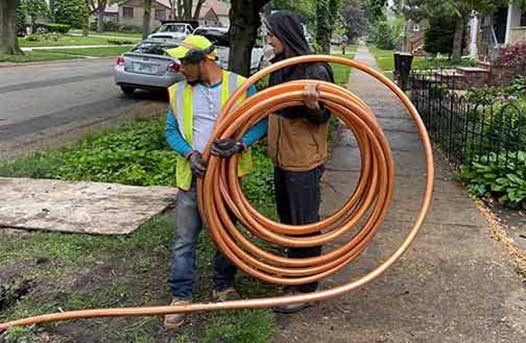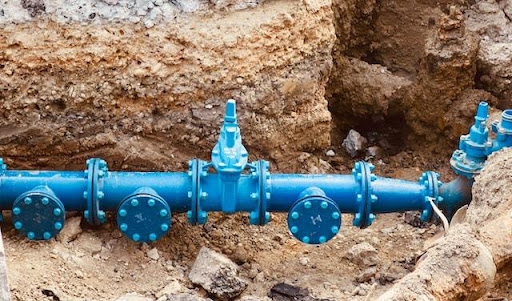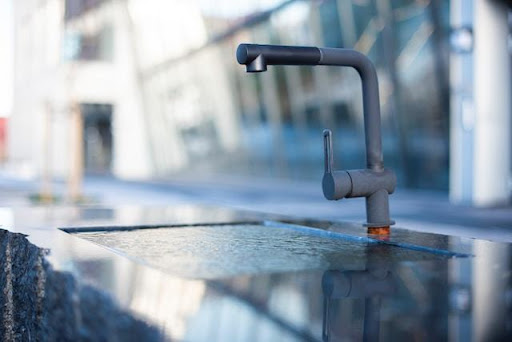
The water supply system in your home is easily the biggest difference between your home and the homes that existed 150 years ago. Access to modern plumbing systems is why we no longer fetch water from streams and transport it over long distances to our homes.
But do you ever ask yourself how this system works?
After the home’s electrical wiring, the plumbing is the most extensive system in your home, says Specialized Property Management Oklahoma City. The network consists of hundreds of feet of pipes with joints, fittings, and other features. This system is divided into two parts: the main water line and the web of pipes connected to it.
Today, we will look at the main water line: the plumbing feature with the most influence on the quality and efficiency of your home’s water supply.
What is the main water line?
The main water line is the large pipe that carries water from the municipal supply into your home. The pipe is usually underground and connected to your water meter and main water shut-off valve. The pipes for the individual plumbing fixtures in your home are all linked to the main water line.
Whatever affects your main water line affects the entire water supply for your home. Common issues that can affect your main water line include:
- Corrosion: Given that it is underground, the water line is particularly susceptible to corrosion due to constant exposure to soil and groundwater.
- Tree root intrusion: Tree roots may dislodge the main water line by growing around it. Tree roots can also penetrate the pipe, leading to blockages and water contamination.
- Shifting soils: If the soil around the home is not unstable, changes in the underground conditions can damage the main water line by altering its slope or cracking it.
- Hydraulic damage: Sudden or sustained changes in the pressure may damage the water line. A common cause of this problem is the installation of systems – pressure gauges, well pumps, cutoff switches, etc. – that are not suited to the plumbing.
- Freezing and thawing: This is a less common problem that happens mostly to pipes that are buried less than four feet in the ground.

If the water line leak is above ground, the resulting flood can ruin your lawn and overflow into the street in front of your home or your neighbor’s properties.
The impact of main water line issues on your home
What are the possible impacts of any of the above problems?
- The first obvious issue is contamination of the water supply. All unwanted materials, including lawn chemicals and sewage, can enter a broken main water line.
- A broken water line will affect the reliability of the home’s water supply. The issues can range from low water pressure to complete termination of the water supply.
- If a water line burst happens below ground, the problem is less obvious but not less damaging. The leak can damage the home’s foundation and impair its structural integrity.
- If the water line leak is above ground, the resulting flood can ruin your lawn and overflow into the street in front of your home or your neighbor’s properties.

If your home’s main water line is starting to show signs of failure, any solution that does not include the replacement of the existing line is simply a stop-gap.
Safeguarding your water supply via a main water line replacement
Water line replacement is often an unplanned but necessary step when your home’s main water line starts to show troubling signs. This crucial step is the only way to put an end to all water supply issues in your home if they are caused by the main water line.
If your home’s main water line is starting to show signs of failure, any solution that does not include the replacement of the existing line is simply a stop-gap. While these temporary solutions may offer immediate relief, they also worsen problems in the main water line.
What happens is that when the main water line eventually fails, the ensuing damage costs a lot more money than the homeowner saved by avoiding a replacement of their main water line. How can you tell when you need a main water line replacement.
- Leaks: These leaks manifest in different ways. You may need to have a professional plumber inspect the main water line to detect where it is leaking.
- Low water pressure: This is a more subtle sign of problems in your main water line, and it can result from leaks in the water line or blockages.
- Strange noises: Strange noises from the water pipes and plumbing fixtures in your home may be coming from the main water line.
What should you do if you suspect that the main water line in your home is damaged?
You need to have an expert inspect and test the water line and the entire plumbing to identify any problems. The expert will also recommend the best water line replacement method for you (based on costs), the kind of pipes in the water line, and other considerations.
Finally, it is always a good idea to deal with these kinds of problems sooner rather than later to avoid future complications and bigger costs. That is why you may want to take action right now.